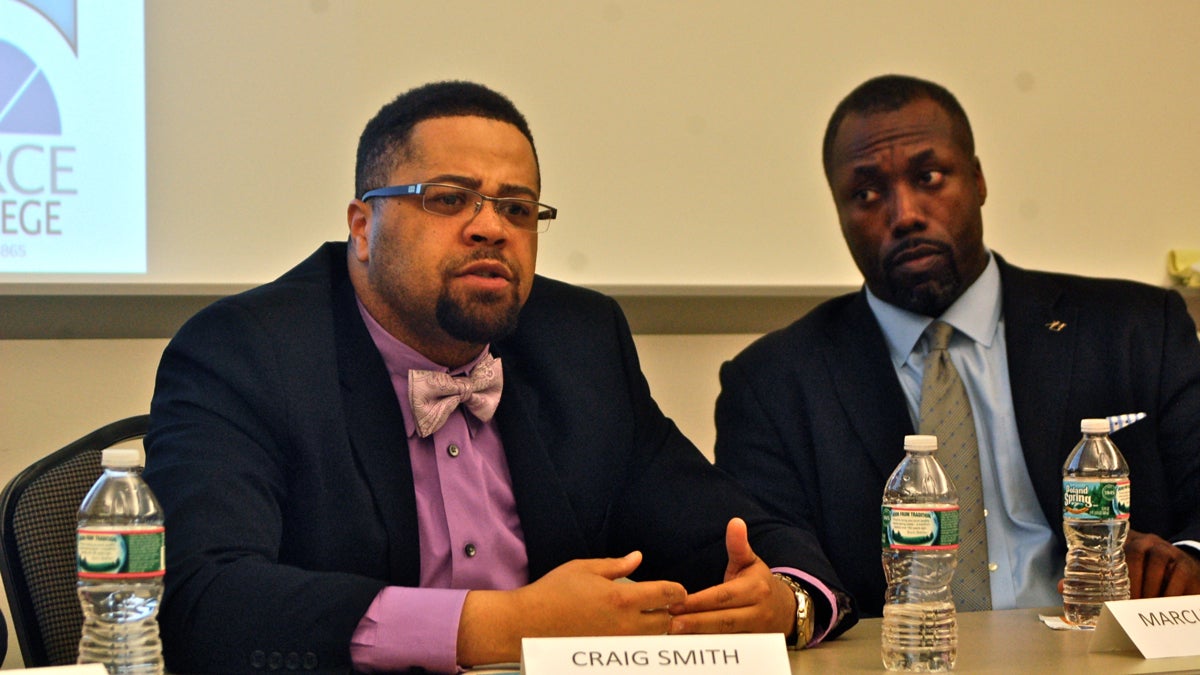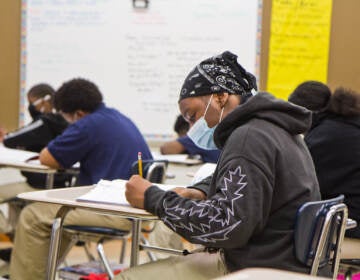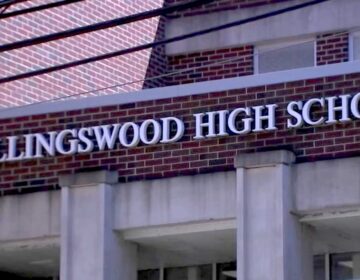‘Fierce conversation’ on race relations launched at Philly’s Peirce College

Panelist Craig Smith of Year Up Philadelphia speaks while Marcus Allen, CEO of Big Brothers/Big Sisters Southeastern Pennsylvania, listens during a discussion on race relations at Peirce College. (Sara Hoover/for NewsWorks)
Recent events in Ferguson, Missouri, have sparked a national dialogue about the relationship between law enforcement and African-Americans. To wrap up Black History Month, Peirce College in Philadelphia brought that conversation home locally with an event on bridging that racial divide.
About 25 community members filled a room on campus to hear panelists from law enforcement, the Mayor’s Office of Public Safety and youth outreach programs.
Organizers of the event called it a “fierce conversation,” purposely taking on a topic that’s hard to address. The objective was to have a broad conversation about racial tensions as a first step to implementing change.
Panelist Mike Noone, first assistant district attorney in Chester County, said he attended because everyone has the right to a safe community.
“You want to be able to live some place where you know you’re safe and protected from criminals by the police,” he said. “There are some places where people feel that’s on its head, and they need to be safe and protected from police. And that’s not the way it should be.”
Some members of the predominantly African-American audience said they were afraid of the Philadelphia police, had been racially profiled and were not sure how to engage with law enforcement.
Topics included law enforcement’s interaction with mental health patients, communities of color and prison populations.
But participants spent a good chunk of the time discussing youth.
“Our kids are probably more impacted than the adults, right?” said panelist Marcus Allen, CEO of Big Brothers Big Sisters of Southeastern Pennsylvania. “Because they’re seeing these images and things happening across the country, and they don’t understand it. They don’t have a context to really make it make sense to them.”
Students have more difficulty learning if they don’t feel safe, he said, and it matters that they feel secure.
Allen, the first African-American CEO of the organization, echoed other panelists’ call for continued dialogue.
“African-American kids are seeing these horrible images of what happens to black men, and then there’s going to be a natural discord that’s going to happen between black kids and the police,” Allen said. “So tonight, I think, was a great start to having a conversation.”
He says both groups must move away from an “us versus them” mentality.
“It’s not the community versus the police. The police are a part of the community,” he said. “And, I think, as we can have those conversations with our kids and get them to understand that they don’t have to be scared of the police.”
Not only were the needs of young students addressed, but the role higher education can play in continuing this discussion.
Dr. Rita Toliver-Roberts, vice president of academic advancement at Peirce, pointed to the college, which serves nontraditional learners and working adults, as a community leader.
“Education affords opportunities for families to grow, change culture and for communities to grow,” she said.
Dr. Tobo Houessou-Adin, the first professor to create and teach African-American studies at Peirce 20 years ago, said that while topics of racial tension come up in her class, just the existence of these courses has been beneficial.
“It’s amazing, especially for people of African descent, to look at history from that perspective,” she said. “They become players of history, the center of discussion, and no longer on the periphery. It empowers them and makes them feel confident and encouraged that they can conquer the world.”
WHYY is your source for fact-based, in-depth journalism and information. As a nonprofit organization, we rely on financial support from readers like you. Please give today.




